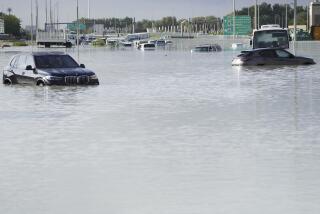Iran vice president resigns under pressure from hard-liners
A top aide to Iranian President Mahmoud Ahmadinejad who had voiced a moderate stance toward Israel came under heavy pressure to resign Sunday as government-controlled news outlets issued conflicting reports about whether he had already left his post.
Meanwhile, hundreds of protesters took to the streets of the central city of Shiraz, chanting anti-government slogans as Iranians prepared for another wave of demonstrations. Protests are likely on Tuesday, the anniversary of the day in 1952 when security forces refused to fire on massive nationwide street protests in support of nationalist hero Mohammed Mossadegh, who was overthrown from his prime minister’s post the following year in a CIA-backed coup d’etat.
Two days after Ayatollah Ali Akbar Hashemi Rafsanjani made a momentous speech that Iranians say gave new life to the protest movement stemming from allegations of vote fraud, he traveled to the holy city of Mashhad to confer with senior Shiite Muslim religious leaders. The trip places him out of town on a day when he had been due to meet with supreme leader Ayatollah Ali Khamenei and other government leaders in Tehran. Analysts describe it as another demonstration of continued discord within the Iranian leadership.
Iranian authorities Sunday also released a senior British Embassy employee. Hossein Rassam, an Iranian national who headed the embassy’s political section, was released on $100,000 bail, his lawyer and news agencies said. The respected analyst was arrested in late June and accused of being a mastermind of the postelection demonstrations that drew hundreds of thousands into Tehran’s streets.
The Pupils Assn. News Agency, an offshoot of the official Islamic Republic News Agency, reported Sunday morning that vice president Esfandiar Rahim Mashaei had quit his post, a report that was later contradicted by the government-controlled Al Alam TV news channel.
The pressure to remove Rahim Mashaei highlights Ahmadinejad’s fragile new political reality in which he is more beholden to extremist groups and individuals who aided in the crackdown against his opponents after his disputed reelection victory last month.
Rahim Mashaei, whose daughter is married to Ahmadinejad’s son, had previously served as head of a state-run cultural and tourism organization but was publicly reprimanded last year after he stated that Iran had no quarrel with the people of Israel, just their government, a position deemed too soft by Iran’s leaders. Ahmadinejad’s decision to name him as his first vice president sparked an immediate furor among hard-line clergy and pressure groups, as well as among some reformists.
“The news of your appointment by the legal president has plunged into deep surprise a large number of idealistic students who endured the widespread wave of defamation launched by opposition against Mr. Ahmadinejad and backed his candidacy,” said a statement by the hard-line Union of Islamic Students on Saturday.
“While reaffirming our support for Mr. Ahmadinejad, the best choice for president, we believe that your immediate resignation from the post of first vice president would be the only way to serve fundamentalism,” it said, adding ominously: “You will be on the receiving end of the dire consequences of this appointment.”
Reformist lawmaker Dariush Ghanbari described the appointment of Rahim Mashaei as a “declaration of war” on parliament, because Ahmadinejad had earlier been asked to consult with the deputies before naming his Cabinet. Parliament speaker Ali Larijani, a prominent conservative, said he was “shocked” to hear of the appointment.
Ahmadinejad this weekend also appointed Ali Abbas Saleh, a U.S.-educated scientist, as head of Iran’s Atomic Energy Organization, a possible olive branch to the West. Many of the president’s appointments to high positions have been drawn from his circle of hard-line loyalists. Ahmadinejad has named his son-in-law Mehdi Khorshidi as his chief of staff, according to the news website Asr Iran.
Amateur videos posted to YouTube showed hundreds of Iranians in Shiraz chanting slogans in an auditorium and marching through a busy square at dusk. Accounts on websites said clashes erupted between the demonstrators and security forces, but those reports could not be confirmed. Official news outlets did not mention any clashes.
Rafsanjani traveled to Mashhad to meet with senior clergy including several top-ranked grand ayatollahs and the head of the judiciary, the conservative news website Baztab reported. He has faced a torrent of criticism since his Friday prayer sermon, which heartened opposition figures by stressing Iran’s democratic features and subtly likening their weeks of protest to the demonstrations that led up to the overthrow of the monarchy in 1979.
Rafsanjani also curried favor with the opposition camp by avoiding the hard-liners’ rhetoric about the demonstrators, who have been described as rioters and dupes of foreign enemies.
His stance that the Islamic Republic ultimately answered to its own people drew a sharp rebuke from Ayatollah Mohammad Mesbah Yazdi, the radical Shiite cleric who is Ahmadinejad’s spiritual advisor.
“In the Islamic establishment, legitimacy and acceptability differ, and people’s support does not necessarily mean legitimacy for the government,” he said, according to the Iranian Students News Agency. “The Islamic Republic takes its legitimacy from God and its acceptability from people.”
--
More to Read
Start your day right
Sign up for Essential California for news, features and recommendations from the L.A. Times and beyond in your inbox six days a week.
You may occasionally receive promotional content from the Los Angeles Times.






